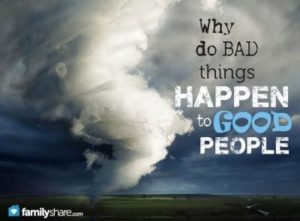 Why do bad things happen to good people? Wrestling with this painful question is nothing to feel guilty about. When Jesus leaves the splendor of heaven, he knows exactly what his mission will be. He is to walk as a man among men, resist all human weaknesses and temptations, and finally die a bitter death on the cross to rescue us from sin and eternal separation from God. Although Jesus knows his mission and the reason for it, the physical and mental torment at Golgotha still wrings an anguished “why?” from his lips. The Bible says that “from the sixth hour there was darkness over all the land until the ninth hour. And about the ninth hour Jesus cried with a loud voice, ‘Eli, Eli, lama sabachthani?’ that is, ‘My God, my God, why hast thou forsaken me?'” (Matt. 27:45-46).
Why do bad things happen to good people? Wrestling with this painful question is nothing to feel guilty about. When Jesus leaves the splendor of heaven, he knows exactly what his mission will be. He is to walk as a man among men, resist all human weaknesses and temptations, and finally die a bitter death on the cross to rescue us from sin and eternal separation from God. Although Jesus knows his mission and the reason for it, the physical and mental torment at Golgotha still wrings an anguished “why?” from his lips. The Bible says that “from the sixth hour there was darkness over all the land until the ninth hour. And about the ninth hour Jesus cried with a loud voice, ‘Eli, Eli, lama sabachthani?’ that is, ‘My God, my God, why hast thou forsaken me?'” (Matt. 27:45-46).
Of course, knowing that it is acceptable to ask God why doesn’t answer the question. Righteous Job suffers terribly. He loses his material possessions, his health, the respect of his friends and neighbors, and his children. Desperately, he wants to know why. “I will speak in the bitterness of my soul,” he says. “I will say to God, Do not condemn me; let me know why thou dost contend against me” (Job 10:1-2). In time the Lord again showers Job with rich blessings, but the man from the land of Uz goes to his grave without ever learning the answer to his burning question.
What Job does know is that God is worthy of trust even when things are going badly wrong. On that tragic day when his entire world collapses, Job tears his robe, shaves his head, falls on the ground, and worships: “Naked I came from my mother’s womb, and naked shall I return; the Lord gave, and the Lord has taken away; blessed be the name of the Lord” (Job 1:21).


You must be logged in to post a comment.